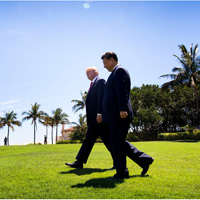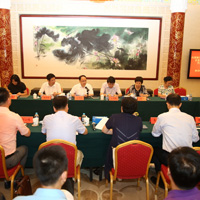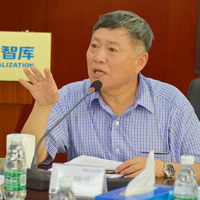- 当前位置:
- 首页>
- 活动>
- ���������������
���������������
CCG持续关注国际关系议题,推动中国与全球化的发展,积极开展国际交流,充分发挥智库“二轨外交”作用,在巴黎和平论坛、达沃斯世界经济论坛、慕尼黑安全会议等重要国际政策与意见交流平台上组织分论坛、边会、圆桌会议、晚宴等活动,促进国际政商学界对话,凝聚共识;CCG积极与各国政界、智库界、工商界开展“二轨外交”活动,每年常态化赴多国调研与交流,促进中外关系攸关方互动,保持与多国政策圈层的沟通渠道。
-

【国际在线】海归人才学习习近平“7•26”讲话 凝心聚力共圆中国梦
国际在线消息(记者黄蓉): 8月1日上午,欧美同学会组织来自多行业、多领域的海归代表们共同就学习习近平总书记在省部级主要领导干部“学习习近平总书记重要讲话精神,迎接党的十九大”专题研讨班开班式上的重要讲话精神的心得体会进行交流。欧美同学会党组书记、秘书长王丕君主持座谈会。 王丕君强调,深入学习贯彻习近平总书记重要讲话精神,切实把思想和行动统一到讲话精神上来,以优异成绩迎接党的十九大胜利召开,是全党的重要政治任务,也是包括广大留学人员在内的全体中华儿女的重要政治任务。在这样重要的历史时刻,不能缺少归国留学人员这一群体的积极响应与响亮声音。 会议上,来自多行业、多领域的海归代表们围绕学习习近平总书记“7·26”重要讲话精神,联系自身行业的实际,谈认识、讲体会。 中国政法大学原副校长、马克思主义学院教授马抗美表示,习总书记“7·26”重要讲话内涵非常的丰富,讲话中提到了中国特色社会主义新的发展阶段、理论创新以及唯物辩证法等等一系列关健词,可以说这篇讲话为十九大召开奠定了重要的政治思想和理论基础。此外,她从自身研究的马克思理论和方法论角度,谈了自己对习总书记讲话的体会。 欧美同学会常务理事、友成企业家扶贫基金会常务副理事长汤敏曾经在国外工作长达10年以上,他对制度进行了深入的比较,认为学习习总书记“7·26”重要讲话精神对他来说体会最深刻的是总书记说的“牢固树立中国特色社会主义道路自信、理论自信、制度自信、文化自信”。他指出,党带领人民实践中国特色社会主义道路,高举中国特色社会主义伟大旗帜确实是符合中国国情的,这“四个自信”是历史、实践告诉我们一定要有的。 此外,汤敏表示,习总书记“7·26”重要讲话提到“特别是要坚决打好防范化解重大风险、精准脱贫、污染防治的攻坚战”,也令他印象非常深刻。从他自身的工作来讲,他建议除了政府、企业帮助贫困人口脱贫、也可以发动广大的消费者多消费一些贫困地区的产品,将扶贫跟互联网结合起来,动员社会力量,来实现中华民族复兴梦。 欧美同学会副会长王辉耀认为,习总书记在讲话中提到的“谋划和推进党和国家各项工作,必须深入分析和准确判断当前世情国情党情”具有深刻的指导意义。他说,党的十八大以来,国际形势风云变幻,而中国展现的大国形象,对全球经济的推动,对全球化的推动都是非常了不起的。十八大以来,党中央提出了一系列新的思路、新的战略、新的举措,其中包括对全球化一个重新的定位和认知。王辉耀说,“中国在国际发展上提出了一系列中国方案,非常及时,而且是带有新的思想,新的推动,我想对于我们留学人员来讲,习总书记的讲话精神值得大家深刻学习,深入贯彻。” “千人计划”专家、国家下一代互新战略联盟常务副理事长傅承鹏说道,习总书记讲话中提到的“四个自信”,即“道路自信、理论自信、制度自信、文化自信”,他对此体会特别深。傅承鹏从自己从事的通信行业说起,改革开放以来,尤其是十八大以来,中国的通信和信息技术发展呈跳跃性。从中国最开始的2G通讯网络远远落后于欧洲同时期的水平的情况下,到如今我们的4G网络与国外并齐,并且做到5G网络技术领先国际,这当中离不开这些年党和政府的创新驱动、简政放权等政策与制度支持。傅承鹏认为,中国在通讯领域还有很多事可以做,并且有信心坚持独立自主创新的道路。 会议上,围绕学习习近平总书记重要讲话精神,结合10余名海归代表们的发言,王丕君总结道,第一,我们要深刻认识十八大以来以习近平同志为核心的党中央带领全党全国各族人民取得的各方面辉煌成就;第二,要深刻理解中国特色社会主义是改革开放以来中国共产党的全部理论和实践的主题;第三,要深刻把握总书记讲话提出的一些重大判断、重要观点、重要论断,深入把握我国社会发展的历史方位、党和国家事业发展的历史性变革,要从五个“坚定不移”中体会党中央在治党治国治军方面取得的卓越成绩,在三个“意味着”中理解中国特色社会主义进入新发展阶段的时代特征,进一步增强对世情、国情、党情的准确判断。作为留学人员就要把思想和行动统一到习近平总书记这一闪耀着马克思主义理论光辉的重要讲话上,进一步增强“四个意识”,坚定树立“四个自信”,做以习近平总书记为核心的党中央的坚定维护者,做中国特色社会主义事业的有力推动者,在进行伟大斗争、推进伟大事业、实现伟大梦想中贡献广大留学人员的智慧和力量。 与会人员纷纷表示,在以习近平同志为核心的党中央的坚强领导下,留学人员一定能够把力量凝聚起来,积极参与到全面建成小康社会决胜阶段的伟大事业中,为中华民族伟大复兴的中国梦做出留学人员应有的贡献,以优异成绩迎接党的十九大胜利召开。文章选自国际在线,2017年8月2日
2017年8月3日 -

【The New York Times】Trump to Open Broad Inquiry Into China’s Trade Practices?
President Trump with President Xi Jinping of China at Mar-a-Lago in Palm Beach, Fla., in April.CreditDoug Mills/The New York TimesWASHINGTON — The White House is preparing to open a broad investigation into China’s trade practices, according to people with knowledge of the Trump administration’s plans, amid growing worries in the United States over a Chinese government-led effort to make the country a global leader in microchips, electric cars and other crucial technologies of the future.The move, which could come in the next several days, signals a shift by the administration away from its emphasis on greater cooperation between Washington and Beijing, in part because administration officials have become frustrated by China’s reluctance to confront North Korea over its nuclear and ballistic missile programs.The investigation will focus on alleged Chinese violations of American intellectual property, according to three people with a detailed knowledge of the administration’s plans. The people spoke on the condition of anonymity because the deliberations were not yet public.Any move by the Trump administration to punish China over its trade practices would raise tensions within the world’s largest trade relationship between two countries. China’s export sector still contributes heavily to its economy growth despite Beijing’s efforts to diversify its economy, and China represents a lucrative market for American automakers, technology companies like Apple, farmers and many others.Still, China’s industrial ambitions — and growing frustration among American companies doing business there — have become harder for United States officials to ignore.China’s policy to become a leading manufacturer by 2025 in the fields of driverless cars, medical devices, semiconductors, artificial intelligence, robotics and many other technologies has caught the attention of officials in President Trump’s administration. The policy, known as Made in China 2025, sets goals for China to be a global leader in 10 fields of industry with the help of huge infusions of state money and the protection of those industries from American competitors.At the same time, the Chinese government has demanded that American companies cut the licensing fees that they charge for key patents and has insisted that companies set up joint ventures to do business in China.In recent months, citing cybersecurity concerns, Chinese officials have said international technology companies like Apple, Amazon and Microsoft must set up China-based data centers if they want to do business there. Chinese officials have also demanded that Western automakers move much of their research into electric cars to China if they want to qualify for large subsidies.Chinese officials did not immediately respond to requests for comment. He Weiwen, a former Commerce Ministry official and longtime trade expert who is now a senior fellow at the Center for China and Globalization (CCG), a Beijing research group, said that the Chinese government would study any American trade case before deciding how to respond and whether to seek intervention from the World Trade Organization, which hears trade disputes.“China thinks that the bilateral trade relation is governed by W.T.O. rules, not American domestic law,” Mr. He said.Despite his harsh rhetoric during the presidential campaign, Mr. Trump has dangled the prospect of smoother trade relations with China in exchange for helping contain North Korea. In May, the two sides claimed modest progress when they reached a trade deal that largely bolstered agreements reached during the Obama administration.Then the policy began to founder.The two sides met on July 19 to produce a series of trade deals that could be portrayed as an “early harvest” in the three months following Mr. Trump’s meeting with President Xi Jinping of China last spring at Mar-a-Lago, Trump administration officials and trade policy advisers said. The two sides were unable to agree on any deals that went significantly beyond what China had previously promised the Obama administration, they said. Both sides ended up abruptly canceling the news conferences they had scheduled to discuss what were supposed to have been their accomplishments.China has also publicly dismissed linking trade and North Korea policy and defended its efforts to improve intellectual property protections. “China highly emphasizes intellectual property protection and has taken many effective measures,” said Sun Jiwen, a Commerce Ministry spokesman, in May following criticism from American trade officials.Under the process that the Trump administration plans to set in motion, the Office of the United States Trade Representative will start an investigation into China’s trade practices. Following the investigation, which could be completed in as little as a few months, the United States could impose steep tariffs on Chinese imports, rescind licenses for Chinese companies to do business in the United States, or take other measures. The process is known as a Section 301 investigation, after the relevant portions of the 1974 Trade Act.Much is at stake for both sides. Exports to the United States represent more than 4 percent of China’s entire economic output. Those exports have created tens of millions of jobs in China and prompted multinationals to shift thousands of factories to China along with much of their latest technology. American exports to China are much smaller, representing about two-thirds of 1 percent of the American economy.American companies have tended to supply the Chinese market using factories and staff in China, instead of exports from the United States. But their profits from the Chinese market are large enough that many corporate executives have been loath to cooperate with United States trade officials, for fear that Chinese government ministries may retaliate against them.The potential impact of the American investigation is unclear at this early stage. Still, previous cases suggest their effect on China’s industrial ambitions may be limited.The last Section 301 case was in 2010 and was initiated by a labor union, the United Steel Workers, instead of by the government, as the Trump administration is preparing to do. The case focused on Chinese business practices in the solar panel and wind turbine industries, and the Chinese government later promised to limit some of these practices.But China’s solar and wind turbine industries have gone on to dominate their global industries, after receiving multibillion-dollar loans from China’s state-controlled banking system despite major defaults on earlier loans.Mindful of those limits, Congressional Republicans discussed in recent months whether to include what is known as a border adjusted tax, which would penalize all imports while benefiting exports, in their plans to overhaul the tax code this year. But the proposed tax ran into heavy opposition from retailers like Wal-Mart that rely heavily on selling goods imported from China.Until a couple weeks ago, it had looked as though the first industry on which the Trump administration would confront China would be steel. But any move to punish Chinese steel imports could hit other nations, too, and the Trump administration decided last month to rely instead on negotiations among the Group of 20 member countries scheduled for August and November.The United States used Section 301 energetically against other countries during the Reagan administration and the administration of President George Bush. Mr. Lighthizer was a deputy United States trade representative in the Reagan administration and has been an advocate of shielding the American industrial base from government-assisted foreign competitors.But the cases then thoroughly antagonized America’s trading partners.“It was really the aggressive uses of this in the late 1980s and early 1990s that prompted the rest of the world to set up the dispute resolution system” of the World Trade Organization, said Chad P. Bown, a senior fellow at the Peterson Institute for International Economics here. (By KEITH BRADSHER)From The New York Times,AUG. 1, 2017
2017年8月3日 -

【人民网】欧美同学会:坚定“四个自信” 期待“十九大”
人民网北京8月2日电(记者熊旭 实习生赵佳)昨天上午,欧美同学会(中国留学人员联谊会)举行座谈会,来自社会各界的十余位归国留学人员畅谈学习习近平总书记在7月26日省部级主要领导干部专题研讨班开班式上重要讲话的感想体会,他们表示要坚定“四个自信”,期待十九大的召开为中国指引新的发展方向。 全国政协委员、解放军306医院原副院长牛忠英表示,学习7.26讲话,最重要的是要坚定维护以习近平同志为核心的党中央,听党指挥,“坚定维护习主席为核心,就是要维护我们全党的团结,维护政治大局”。 中国政法大学原副校长、教授马抗美说,中国特色社会主义是改革开放以来党的全部理论和实践的主题,她认为马克思主义基本原理与中国国情相结合,推动了马克思主义中国化的进程。“我们要辩证分析形势,在实践基础上推动理论创新,只有在坚持马克思主义理论的基础之上,才能创新和发展,使中国特色社会主义理论体系更加具有科学性和实践性,为中国特色社会主义伟大实践提供科学指南”。 国务院参事、全球化智库(CCG)理事长兼主任王辉耀表示,中国的全球化历程加快,不仅在国际人才政策上取得突破,也对推动世界全球化做出很大贡献。 北京市政协委员、优客工场创始人、董事长毛大庆认为讲话强调了“头部”力量,推进了国家创新性建设,“创新创业的年轻人身上有国家的希望,简政放权给了创新创业巨大的发展空间”。 中国人民对外友好协会民间外交战略研究中心主任李新玉从国际关系视角入手,“中国特色社会主义没有现成的模式,欧美模式也开始失灵了,中国需要创新,需要走以前没有的路”,她认为中国制度的创新需要中国智慧。 黑龙江省政协委员、黑龙江冠今农业技术开发有限公司董事长胡公略说,“中国需要创新,中国正在创新,创新成果需要具有创新思维的人才”,他认为对留学人员来讲,自信就是在工作岗位上利用自己的独特优势,生产出达到国际顶尖水平的优质产品。 中石化北京化工研究院首席科学家刘立志提出,坚持“四个自信”,要在经济上将创新创业的口号落到实际,将我国建设为工业制造强国,避免落入“中等收入陷阱”,让国家真正富强起来。 国务院参事、友成企业家扶贫基金会常务副理事长汤敏认为,防范化解重大风险、精准脱贫、污染防治攻坚战是未来三年最重要的工作,他强调要加强对市场的监管,“一系列措施都是要防范各个市场里反复出现的‘灰犀牛’现象”。 欧美同学会党组书记、秘书长王丕君说,“我坚信,在以习近平同志为核心的党中央的坚强领导下,广大留学人员一定能够把力量凝聚起来,积极参与到全面建成小康社会决胜阶段的伟大事业中,为中华民族伟大复兴的中国梦做出留学人员应有的贡献,以优异成绩迎接党的十九大胜利召开”。文章选自人民网,2017年8月2日
2017年8月3日 -

【The New York Times】America’s Competitors Angle for Silicon Valley’s Business
The view through a window used to organize activities at Wizeline’s office in Guadalajara, which is sometimes called the Silicon Valley of Mexico. Wizeline, a start-up based in San Francisco, has its main operations in Guadalajara. CreditRodrigo Cruz for The New York TimesGUADALAJARA, Mexico — With his frequent refrains about Mexicans and the need for a wall to contain them, it’s no surprise that President Trump has made few friends in Mexico.Yet here in the capital of Jalisco State, sometimes referred to as Mexico’s Silicon Valley, people are practically celebrating him.“He’s helping us a lot!” Gov. Aristóteles Sandoval exclaimed. “He’s put us on the world’s agenda.”As part of Mr. Trump’s efforts to push an America-first philosophy, he has vowed to restrict the availability of special visas that are widely used by technology companies to hire talent from around the world.Mr. Trump’s plans, combined with an American political climate that has left many immigrants feeling less welcome, has cast a pall of uncertainty over the American tech industry, which relies heavily on highly skilled workers from abroad.But while entrepreneurs and executives in the United States are fretting, other countries — including Mexico, Canada and China — are salivating over the Trump administration’s rumblings.Silicon Valley’s loss, they say, could be their gain.In recent months, foreign governments and tech industry leaders have sought to capitalize on the uncertainty in Silicon Valley. They are stepping up their efforts to attract engineers and entrepreneurs who might rely on the special American visa program, known as H-1B, to work or to run businesses in the United States.Andy Kieffer, founder of Agave Lab, a venture capital firm in Guadalajara. Interest in Mexico among investors seems to have shot up, he said. CreditRodrigo Cruz for The New York Times“It’s an exciting time,” said Brad Duguid, the minister of economic development in Ontario, where the capital, Toronto, is one of Canada’s biggest tech hubs. “And while it’s unfortunate that the U.S. is looking more internally, far be it from us not to take advantage of that.”In June, Canada set up a new visa program that makes it easier for companies to recruit highly skilled foreign workers. Under the program, which was in development before Mr. Trump’s election victory, the Canadian government has promised to approve two-year visas in less than two weeks — blindingly fast, compared with the process in the United States.And unlike the H-1B visa in the United States, there is no limit to the number of Canadian visas available.Beyond that, Ontario is in the early stages of preparing a social media campaign for technology executives around the world to sell the province as a place for investment.“Canada is seizing its moment,” said Navdeep Singh Bains, the country’s federal minister of innovation, science and economic development. “We’re open to trade and people.”In Mexico, states with growing regional tech hubs, like Jalisco, have been redoubling their efforts to attract talent and investment in recent months, peddling a philosophy of openness that departs from what Mr. Sandoval called Mr. Trump’s “xenophobia” and “lack of global vision.”The efforts have included visits by Jalisco officials to the San Francisco Bay Area and to Europe. The San Francisco Chronicle published an op-ed piece by Mr. Sandoval pitching the advantages of doing business in his state.The officials herald Mexico’s proximity to Silicon Valley, its alignment with time zones in the United States and its lower cost of living. They are also sweetening the invitation with enticements like tax incentives and promises of full government cooperation.Employees of the start-up Musical.ly in Shanghai. China’s tech leaders hope to seize on opportunities created by President Trump’s immigration policies. CreditGilles Sabrie for The New York Times“We want you,” says a new promotional website, Come2Jalisco.com. “Innovation has no borders.”Even Mexico’s ambassador to India has echoed the pitch.“We will be more than happy to have Indians relocate to Mexico,” the ambassador, Melba Pría, told The Indian Express newspaper earlier this year, emphasizing the “visa ease” that foreign talent will experience in Mexico.China’s tech leaders have also been seizing on the opportunity created by Mr. Trump’s immigration policies.Wang Huiyao, founder and president of the Center for China and Globalization (CCG), a research group in Beijing, said Mr. Trump’s “America First” doctrine was a boon for China’s efforts to attract foreign tech talent and persuade Chinese engineers now working abroad to return home.“China is shifting from attracting foreign capital to foreign talent,” Mr. Wang said. “The U.S. is losing out.”Among the Chinese voices leading the push is that of Robin Li, the chief of Baidu, China’s largest search engine.“Many entrepreneurs in Silicon Valley have expressed their concern that this will hurt America’s field of innovation,” Mr. Li said recently at China’s World Internet Conference. “I really hope that talent from all over the world comes to China.”President Emmanuel Macron of France has sought to throw open a slightly different door. When Mr. Trump announced that he was pulling the United States out of the Paris climate accord, Mr. Macron extended an unusual offer to Americans: “To all scientists, engineers, entrepreneurs, responsible citizens who were disappointed by the decision of the president of the United States, I want to say that they will find in France a second home.”Robin Li, chief executive of the Chinese search engine Baidu, at a data conference earlier this year in Guiyang, China. Mr. Li hopes to draw tech talent to China. CreditImaginechina, via Associated PressThese messages of welcome stand in contrast to the Trump administration’s tough approach to immigration.In an executive order this spring, Mr. Trump directed federal agencies to review immigration laws with an eye toward ending what he called “the theft of American prosperity.”The president has taken particular aim at the H-1B visa program, under which the government admits 85,000 highly skilled foreign workers every year, most of them in the tech field.Mr. Trump says businesses use the program to avoid hiring higher-paid Americans, and his executive order instructed the agencies to ensure that visas were awarded to the most skilled, best-paid immigrant workers.Disney, Toys “R” Us, Southern California Edison and New York Life are among the companies that have laid off American tech workers who first were asked to train their replacements — tech workers from low-wage countries like India brought in on temporary visas. In some cases, the jobs themselves went back home with the new workers.Canada revised its temporary visa program partly because the Royal Bank of Canada, the country’s largest financial institution, shuffled jobs overseas using that technique.Mr. Trump’s executive order made no immediate changes, but it has sowed concern throughout the industry. Competition for H-1B visas was already intense. The government received 199,000 applications in the first five days of its lottery this year, then stopped accepting them. Many companies fear that Mr. Trump’s efforts might put highly skilled immigrant workers even further out of their reach.A change could favor the biggest American tech companies, which tend to pay the highest wages. But it could hurt some of the biggest users of the H-1B program — the outsourcing companies, including several from India — that bring thousands of workers to the United States on lower wages to handle computing tasks for banks, health care companies and other firms.Jaime Reyes Robles, an official with the Mexican state of Jalisco, said President Trump’s immigration policy “has been our best marketing.” CreditRodrigo Cruz for The New York TimesIt could also hurt start-ups and smaller firms without the cash to compete on salaries.Adding to the uncertainty, the Trump administration said last month that it would delay, and perhaps eliminate, an Obama-era rule allowing thousands of foreign entrepreneurs to move to the United States every year to build start-ups.“People here are extremely nervous,” said Andreas Kraemer, managing partner of MITA Ventures, a San Francisco-based venture capital firm. “This whole area is driven by immigration.”The White House referred questions about whether the uncertainty surrounding temporary visas could shift jobs to other countries to the Department of Homeland Security. The department declined to comment on Tuesday.León David Pérez, president of Propulsar, a Mexico City-based company that develops tech start-ups and has an office in San Francisco, argued that Mr. Trump’s policies could jeopardize Silicon Valley’s culture of creativity.“When you want to spur innovation, the best way to generate it is to employ the greatest diversity of people,” he said. “That’s what’s being threatened with Trump’s policies.”The uncertainty in Silicon Valley — combined with the invitations from around the world — have already begun to lead some tech companies and entrepreneurs to rethink the gravitational pull of Silicon Valley.Business interest in Jalisco has soared since Mr. Trump’s election, leaders in the state’s tech sector contend. Mr. Trump’s immigration policies, said Jaime Reyes Robles, Jalisco’s secretary of innovation, science and technology, have been “our best marketing.”In 2003, Manuel R. Gutiérrez Novelo, a Mexican engineer, moved to Silicon Valley to develop TDVision Systems, a company specializing in 3D technology. He went on to develop a multipronged operation based in California, with offices in Europe and Asia.Wizeline’s office in Guadalajara, where public officials have been redoubling their efforts to attract talent and investment in recent months. CreditRodrigo Cruz for The New York TimesBut in recent weeks, he uprooted his businesses and moved them back to Guadalajara, his hometown. Mr. Trump’s efforts to restrict immigration were a big reason, he said, calling them anathema to his company’s philosophy and a potential barrier to hiring foreign workers.“If I saw Donald Trump, I’d tell him he has lost my business,” he said.For decades, Jalisco was mainly a center for tech manufacturing. But as its talent pool has expanded, fed by highly regarded engineering programs at local universities, it has increasingly become a place for high-tech innovation.Andy Kieffer, an American entrepreneur who runs Agave Lab, a venture capital firm in Guadalajara, said that when he was seeking investors in Silicon Valley several years ago, he was waved off.“I couldn’t get anyone to look at Mexico,” he recalled. “They said, ‘Look, I don’t know anything about Mexico. It’s off my radar.’”But in the past several months, he said, interest among investors has shot up.In Canada, officials expect their new visa to give their tech industry a big boost. Not only is there no limit on the number of visas, but government employees have been hired to act as visa concierges to make it easier for companies.“It’s a huge advantage when you contrast it to what’s happening across the border,” said Stephen Lake, whose company, Thalmic Labs, produces devices that enable users to control computers through gestures.Sharoon Thomas, an Indian entrepreneur, last year began shifting his start-up from Mountain View, Calif., to Toronto, and officially made the move in May. Seven of his engineers are still working in the United States and other countries, but he plans to use Canada’s new visa program to bring them north.“Canada’s immigration policy makes you feel more welcome than the U.S.,” said Mr. Thomas, whose company, fulfil.io, designs software to manage inventories.Evan J. Green, an immigration lawyer in Toronto, said he was helping companies in banking, insurance and retail seek visas for employees.“These people have options,” he said. “This is the best and the brightest of the world. We want these people. This is good for Canada. Let’s keep the door open while they’re slamming it shut south of the border.” (By KIRK SEMPLE and IAN AUSTEN)From The New York Times,AUG. 2, 2017
2017年8月3日 -
钱颖一给大学新生的推荐书单
专家简介钱颖一,全球化智库(CCG)学术委员会专家,清华大学经济管理学院院长。2017级清华经管学院本科新生们:首先,我衷心祝贺你们在今年的高考中取得优异成绩,即将成为清华大学经济管理学院的本科生。在你们沉浸在喜悦之中,憧憬着清华园大学生活之时,我写信给你们,传递一个极其简单的理念,就是要从现在起多读书,多思考。怀特海(Alfred North Whitehead)曾经这样比较过大学与中学的不同:“在中学里,他伏案学习;在大学里,他应该站起来,四面瞭望”。艾伦·布鲁姆(Allan Bloom)对大学的描述则更加具体:“在短短四年中,他必须了解,在以往他所知晓的那个小小的世界之外还存在更为广阔的天地,亲自领略它的乐趣,充分汲取知识的营养,以支撑自己去征服那片注定要穿越的知识荒漠”。当今社会信息获取如此之便利,更加突显读书的重要性,因为书籍和信息是互补的,不是替代的。读书不仅可以帮助你了解周围的世界,而且还可以帮助你建立思考的框架。人类文明是如何发展到今天?中国改革应该向何处去?在大学期间应该学习什么?寻求这些问题的答案,不读书不行,不通过读书来思考也不行。我在这里向你们推荐十本书,建议你们利用暑期时间认真阅读其中的至少四本。这些书是人文与社会科学领域的一些富有时代气息而又具有成为经典潜质的书籍,它们可以帮助你们从更加开阔的角度去开启对人生与社会的思考。这些书也很有趣,或许可以挽救你们因为高考而丧失的读书兴趣。如果阅读这些书还能激发你们的好奇心、想象力和批判性思维,那更是求之不得。请你们重拾书页,开始新的人生旅程。我期待着你们来到清华经管学院。钱颖一 清华大学经济管理学院院长 2017年7月10日本科新生入学推荐读物2017年7月1. Freakonomics: A Rogue Economist Explores the Hidden Side of Everything, by Steven D. Levitt and Stephen J. Dubner, William Morrow, 2005.《魔鬼经济学》/史蒂芬·列维特、史蒂芬·都伯纳著,刘祥亚译,广东经济出版社,2006。2. Justice: What's the Right Thing to Do?, by Michael J. Sandel, Farrar Straus & Giroux Press, 2009.《公正:该如何做是好?》/迈克尔·桑德尔著,朱慧玲译,中信出版社,2011。3.Our Underachieving Colleges, by Derek Bok, Princeton University Press, 2006.《回归大学之道》/德雷克·博克著,侯定凯等译,华东师范大学出版社,2008。4.Steve Jobs, by Walter Isaacson, Simon & Schuster, 2011.《史蒂夫·乔布斯传》/沃尔特·艾萨克森著,管延圻等译,中信出版社,2011。5. Mass Flourishing: How Grassroots Innovation Created Jobs, Challenge, and Change, by Edmund Phelps, Princeton University Press, 2013.《大繁荣:大众创新如何带来国家繁荣》/埃德蒙·费尔普斯著,余江译,中信出版社,2013。6. Guns, Germs, and Steel: The Fates of Human Societies, by Jared M. Diamond, W. W. Norton & Company, 1999.《枪炮、病菌与钢铁:人类社会的命运》/贾雷德·戴蒙德著,谢延光译,上海译文出版社,2006。7.Sapiens: A Brief History of Humankind, by Yuval Noah Harari, Harper, 2015.《人类简史:从动物到上帝》/尤瓦尔·赫拉利,林俊宏译,中信出版社,2015。8.Country Driving: A Journey Through China from Farm to Factory, by Peter Hessler, HarperCollins Publishers, 2010.《寻路中国:从乡村到工厂的自驾之旅》/彼得·海斯勒著,李雪顺译,上海译文出版社,2011。9.《上学记》(第 2 版),何兆武著,生活·读书·新知三联书店,2008。10.《中国在历史的转折点:当代十贤访谈录》,马国川编,中信出版社,2013。文章选自清华大学经济管理学院,2017年7月24日
2017年8月2日 -

【人民网】世界秩序的重塑:中国是现存国际秩序的维护及受益者
人民网北京8月1日电 7月31日,全球化智库(CCG)邀请CCG学术委员会专家、资深中国问题专家、美国丹佛大学约瑟夫·克贝尔国际关系学院终身职正教授、美中合作中心主任赵穗生发表未来全球秩序下中国的定位以及中美关系的未来走向的演讲。 赵穗生表示,目前的世界秩序面临着两方面挑战。第一个挑战是中国作为一个崛起的大国,进入21世纪后对现存的国际秩序越来越不满意也更多地参加到全球治理进程中。第二个挑战来自于美国本身,虽然现存秩序是美国自己领导和塑造的,但特朗普上台后在瓦解或挑战这个秩序,这种挑战和中国的崛起加在一起,二战以后的世界秩序面临着重建。 赵穗生认为“中国并没有替代,也不可能在短期内替代美国而重新塑造二战以后的世界秩序。在国际社会来看,过去中国只讲参与,从来没有谈引导,现在中国要引导国际社会建立国际秩序和国际安全,中国在国际治理中的角色就发生了转换,中国很大程度上在全球治理中要发挥领导作用。 赵穗生说,“中国目前做的事情并非要取代美国。” “硬实力”方面,国际秩序的塑造者要花很多资源,中国目前还没有足够的资源来取代美国。事实上美国已经深深地嵌入全球生产链中,特朗普的很多政策仍然脱离不了传统上美国在国际事务当中的责任。 “软实力”方面,美国在世界上的领导地位不仅是由于其硬实力,很大程度也是它的软实力。此外,中国还是现存美国主导的国际秩序的最大受益者。有学者提出,亚洲本身就会受到挑战,因为亚洲这些国家的历史恩怨以及边界冲突,很大程度上能被压抑住是因为美国这些年在这个地区所建立的一套安全体系所起的作用,美国在这些地区的影响力中国在相当长时期不可能替代。 他总结表示,中美之间的发展不是一种零和游戏,完全是一种双赢,中美之间的相互依存程度已经达到前所未有的地步。多年来,中国正在发挥越来越重要的作用,很大程度上是要求改革现存秩序,而不是要重新塑造国际秩序,是要改变美国在国际事务中的霸权,改变中国在国际游戏规则制定中的地位。从中国角度来讲,也应该明确向全世界宣布,中国是现存国际秩序的维护者,因为中国仍然是受益者,但中国要改革的是国际秩序中,以中国为代表的发展中国家或新兴国家的发言权和代表权。这是中美之间全球博弈的焦点。(常红 陈月柳)文章选自人民网,2017年8月1日
2017年8月2日 -

【环球时报】“菲佣入华”消息引国内媒体关注
【《环球时报》报道】菲佣要来中国,而且月薪高达人民币1.3万元?据《菲律宾星报》7月31日报道,菲律宾劳动就业部7月30日发布一份报告称,中国大陆打算聘请菲律宾家政服务人员前往北京、上海、厦门等5个大城市就业,并承诺给予这些菲佣很高的工资。中国驻菲律宾大使馆新闻发言人李凌霄7月31日对《环球时报》记者表示,不掌握此事情况。菲律宾驻华使馆同一天对《环球时报》表示,双方仍在商讨阶段。截至发稿,中国人力资源和社会保障部尚未对《环球时报》的相关采访做出回应。 菲律宾一直以来将菲佣作为一种产业向外输出。菲律宾家政服务人员是高级佣工,因文化程度较高,懂英语,有“世界上最专业的保姆”之称。中国香港、新加坡和美国是菲律宾女佣最喜爱的目的地。全球化智库(CCG)秘书长苗绿7月31日接受《环球时报》记者采访时表示,目前,菲佣在中国国内已经是一个既有现状,不论是否合法合规,一些人对菲佣已经有了需求。尤其对于中国家长而言,希望孩子从小能学好英语,母语为英语的菲佣在这方面有优势。 香港《商报》称,香港目前有35.2万名外籍家庭佣工,其中18.9万人为菲律宾外佣。目前香港外佣的最低工资为月薪4310港元(约合人民币3712元),较菲律宾当地工人平均月薪1700元高出1.5倍。新加坡的菲佣数量为7万人,最低工资为570新加坡元(约合2826元人民币)。4月初,日本首次“引进”菲佣,月薪为16.8万日元(约合人民币1.02万元),相当于菲律宾同类工作的大约10倍。《菲律宾星报》称,即将入华的菲佣月收入可达1.3万元。苗绿认为,目前,国内家政市场的服务质量和发展水平还无法满足快速增长的中产阶级需求,如果可以引入菲佣,一方面会带来“鲶鱼效应”,另一方面,会倒逼该行业培训、服务等方面的质量提升。 截至目前,中国大陆允许获得在华永久居留资格或持有工作类居留许可的外籍人才和港澳台高层次人才聘用外籍家政服务人员,而普通家庭雇用菲佣并不合法。一位曾对菲佣在华现状做过调研的专家表示,其实在北京、上海等发达城市的高端社区,经常能见到菲佣。 但中国真的需要那么多菲佣么?北京大学经济学教授曹和平7月31日接受《环球时报》记者采访时表示,菲律宾有输出家政服务人员的传统,在该领域的专业程度确实高于国内平均水平。适当引入菲佣,可以带活国内家政服务市场,也可以起到示范、引导作用。但中国对于菲佣的引进需要谨慎,因为这不是普通的“农民进城”而是“外国农民进城”。曹和平认为,目前,我国劳动力整体充足,还没达到需要从国外进口劳动力的阶段。 此外,曹和平认为,中国庞大的城市人口和新兴中产阶级有着广阔的市场,如果中国大量放开市场引入菲佣,大批菲律宾劳动人口从该国出走,会对菲律宾本国的经济与全球家政市场造成冲击。文章选自《环球时报》,2017年8月1日
2017年8月2日